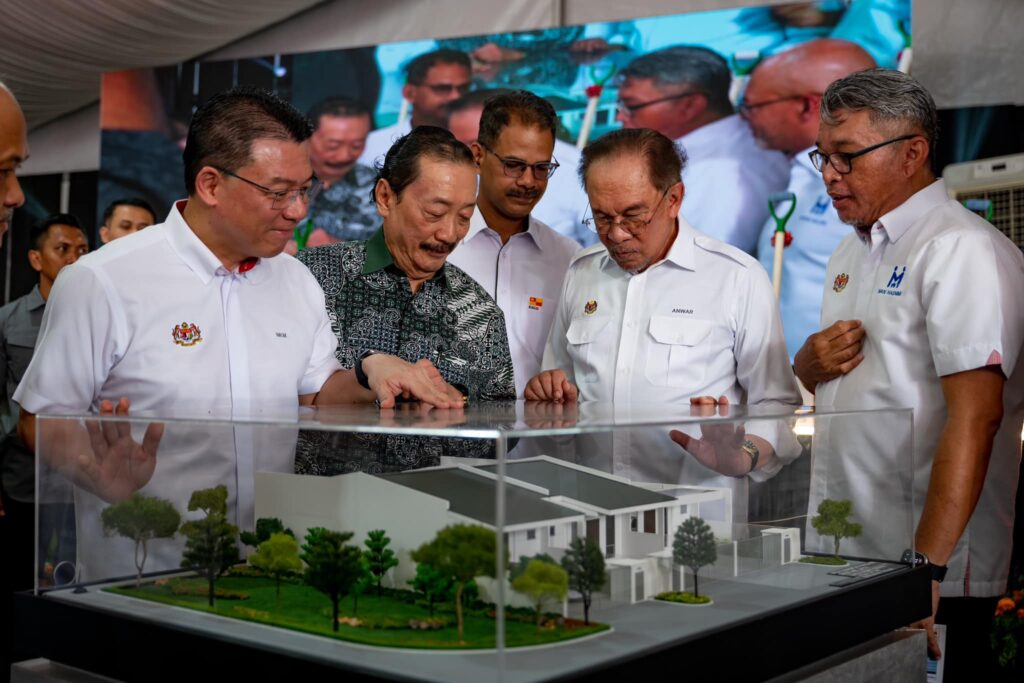
KUALA SELANGOR, Feb 15 (Bernama) — Datuk Seri Anwar Ibrahim has proposed that the Residensi Rakyat (PRR) Harmoni MADANI Bestari Jaya programme be used as a model for estate-government collaboration in developing workers’ housing.
The Prime Minister said that such cooperation could be realised by having estate management provide land, thus allowing the government, through the Ministry of Housing and Local Government (KPKT), to plan housing developments for the well-being of plantation workers.
He highlighted that the PRR Harmoni MADANI Bestari Jaya initiative, developed through this collaborative model—where Berjaya Corporation Berhad handed over estate land to the government—successfully addressed the long-standing housing issue affecting plantation workers there for the past 27 years.
“This project took quite some time to materialise until Nga Kor Ming (Minister of Housing and Local Government) successfully negotiated with Tan Sri Vincent Tan (the landowner), who agreed to hand over part of the land for this project.
“Kor Ming took the initiative to negotiate with the estate management, municipal council, and state government before bringing the matter to the Cabinet, where we decided to allocate funds for the PRR development,” he said during the groundbreaking ceremony for PRR Harmoni MADANI Bestari Jaya here today, which was also attended by Nga.
The PPR Harmoni MADANI Bestari Jaya project involves the construction of 1,200-square-foot terrace houses, each equipped with three bedrooms and two bathrooms. The development, spanning 8.09 hectares of land owned by Berjaya Corporation Berhad at Ladang Sungai Tinggi, is being carried out by PR1MA Corporation Malaysia, the appointed implementing agency.
The RM75 million project, expected to be completed within two years, is set to benefit 1,250 residents, including 245 rubber estate settlers from five different estates in the Bestari Jaya area.
Anwar, who is also Finance Minister, emphasised that the MADANI government is committed to ensuring that estate workers, particularly from predominantly Indian communities, are not left out of development plans, especially in housing initiatives.
He urged relevant agencies and officials to provide accurate information to the government so that development plans can be effectively executed without delay.
“Local authorities must collaborate and provide information on how we can help… The workers here need proper housing, complete with facilities that allow their children to live and study in a conducive environment,” he said.
To accelerate the development of people-centric projects, Anwar called on local authorities (PBT) to expedite the approval process for Planning Permissions (KM) to avoid cost escalations due to delays.
He commended the proactive approach taken by the Kuala Selangor Municipal Council (MPKS) in fast-tracking the KM process for the PRR Harmoni MADANI project and urged other local councils to adopt a similar approach for development approvals that benefit the people.
“Thank you, MPKS, for expediting the KM process. When everything is in order and all parties have agreed, why delay? If everything is properly arranged, don’t stall because delays will lead to additional costs, which will ultimately burden both the people and the government,” he said.
The Prime Minister also underscored the importance of negotiations as a key approach to resolving issues related to public welfare.
Anwar pointed out that PRR Harmoni MADANI is a prime example of how successful negotiations between various stakeholders can lead to the undertaking of a project that previous administrations had failed to implement.
“When we negotiate properly, we can solve the people’s problems, instead of stirring up sentiments and questioning what the government is doing—especially when, during their own tenure, they failed to address these very issues,” he added.
— BERNAMA